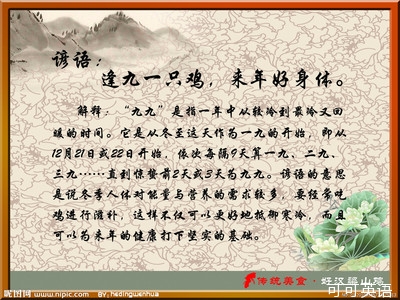(单词翻译:单击)

句子:
Psychologists find many proverbs are hit-or-miss.
误译:
心理学家们发现许多谚语很随便。
正译:
心理学家们发现,谚语不一定有道理/有的有道理,有的没有道理。
翻译加油站:
Chamber's Dictionary of Idioms arid Catch Phrases 给hit-or-miss下的定义是 without any system or planning;careless,倒是有点“随便”的意思,可是“谚语很随便”是什么意思?大概没有几个人能明白。
我们来分析一下hit-or-miss(有时也说hit-and-miss,也可不用连字符)的本来意思。hit的意思是“打中”、“击中”,如:
hit the ball,hit the target,hit the bull's eye (打中靶心)。谚语 hit the nail on the head (打中要害;一针见血)中的hit就是此意。
又如:
Another typhoon hit the island.
又一场台风袭击了该岛。
注意:hit表示的是结果,和shoot(击中)二样,“想打某人(不一定会打中)”要说hit at somebody。miss的意思正相反,即 “没有打中”如:
The falling rock just missed my head.
掉下的石头差一点打着我的头。
所以hit-or-miss的原义是“也许打中了,也许没有打中”,“有很大的偶然性”。如:
Your reading has been too hit-or-miss.
你看书一点儿也没有计划,漫无目的。
George didn’t know which house on the street was Jane's, so he began ringing doorbells hit-or-miss.
乔境不知道简住街上哪一栋房子,只好漫无边际地/东一家西一户地按门铃碰运气。
美国口语中有—说法hit the/one's books,意思是“啃书本”,“用功”,如:
I m gonna hit my books. There'll be another test tomorrow.
我得用功去了,明天还有个测验呢。
原句的是谚语,其意思是“有些谚语说到了点子上”,即 “很有道理”,而“有些谚语没有说到点子上",即“不正确”。
人们常说,“谚语是各个民族传下来的智慧的结晶”,事实上,由于人们的认识能力和谚语产生时的时代局限性,不少谚语不一定正确,甚至是错误的。
英语中还有一个由hit组成的词hit-and-run,最早出自棒球运动,击球手击中球后扔下球棒就赶紧跑垒。不少人用这个词翻译游击战“打了就跑”的战术,可是英美人现在多用这个短语指交通肇事逃逸,如:
Judges are very strict with hit-and-run drivers in this state.
这个州的法官们对交通肇事逃逸的司机判得很严。


